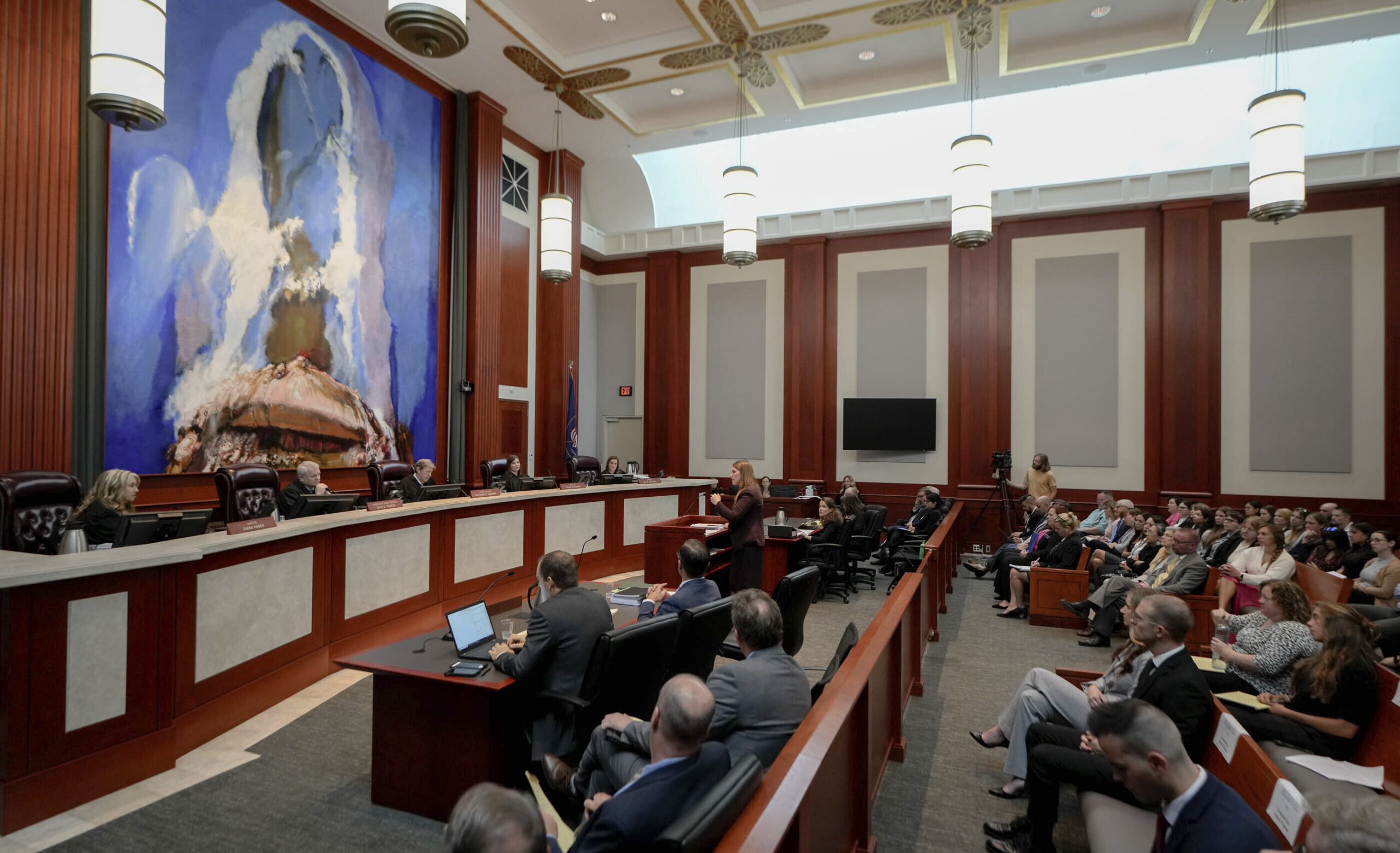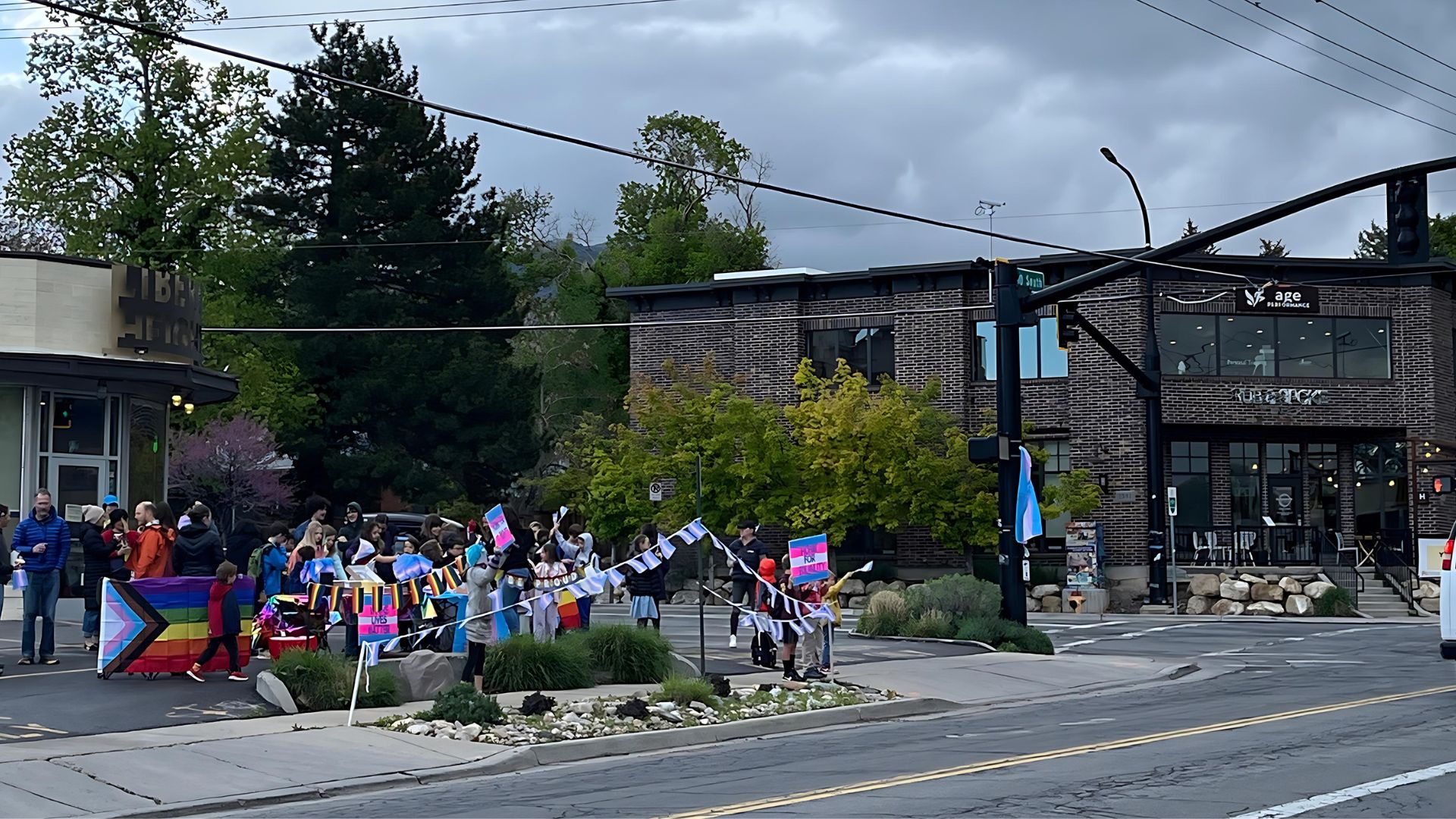Utah Supreme Court hears arguments to keep abortion trigger law on hold
Aug 8, 2023, 7:25 AM | Updated: 6:21 pm

The Utah Supreme Court listens to oral arguments involving the Utah abortion trigger law, Tuesday, Aug. 8, 2023, in Salt Lake City. The state Supreme Court is weighing a lower court's decision to put a law banning most abortions on hold more than a year ago. (Francisco Kjolseth/The Salt Lake Tribune via AP, Pool)
(Francisco Kjolseth/The Salt Lake Tribune via AP, Pool)
SALT LAKE CITY — The Utah Supreme Court heard oral arguments on Tuesday over whether Utah’s abortion trigger law should stay on hold or take effect before the case is ultimately decided.
Arguments lasted around four hours and delved into whether equality and the right to bodily autonomy under Utah’s constitution protect the right to an abortion, whether Utahns have a right to make their own medical decisions, the harm that might occur if the law takes effect, and the standing of Planned Parenthood to try and keep the law paused.
Another undercurrent from Tuesday’s arguments — whether the high court should decide that the lower court erred in its decision to put the law on hold since the standards for granting injunctions now only apply to whether the case can win at trial.
It’s not known when the justices might make a decision. If they decide to repeal the injunction, Utah’s trigger law would become the law of the land until the courts decide whether it violates Utah’s constitution.
The state’s arguments for why the Utah trigger law should take effect
Taylor Meehan argued that the case was not likely to prevail on its merits because there is no abortion exception in the state’s Constitution and so the legislature remains free to legislate the thorny issue.
A central theme emerged over whether the founders intended to include abortions when they wrote that Utah’s Constitution provides for “… Both male and female citizens of this State” to “enjoy equally all civil, political and religious rights and privileges.”
Meehan argued state founders long held that abortions were not protected.
“It was well known that when the state’s pre-Roe laws were executed, doctors were prosecuted,” she told the justices. “And if you look at those cases … there’s never an utterance of unconstitutionality.”
Meehan faced tough questions from the justices over other issues. Those included Utahns’ rights to make their own medical decisions.
“Abortion is not just one person’s right to bodily autonomy, it also protects the life of the unborn,” Meehan claimed.
This morning the Utah Supreme Court is hearing oral arguments at for the abortion case.
I’m prolife and will continue to fight for the unborn. pic.twitter.com/jSoFc7rNkn
— Daniel McCay (@danmccay) August 8, 2023
The justices spent considerable time discussing whether Planned Parenthood had standing.
Meehan argued Planned Parenthood isn’t the one being harmed by its constitutionality claims. Rather, she said the women who would need an abortion could be constitutionally harmed. Meehan also didn’t believe Planned Parenthood has third-party standing, acting on behalf of the women.
“Just as they’ve amended their complaint they can amend their complaint to add an individual plaintiff,” Meehan argued.
Lawyers for PPAU argue equal protection means access to abortions
We are grateful to have had our day in court and are hopeful that the supreme court rules swiftly to permanently block the implementation of this dangerous and harmful ban. Abortion is healthcare, Abortion is a right. pic.twitter.com/x6e3IpZD1w
— PPAC Utah (@ppacutah) August 8, 2023
And Vega pushed back on the state’s claim that Planned Parenthood doesn’t have standing.
“There are ethical harms … and there are also reputational harms, for example … if we win at the end of the day and this law has allowed to be in effect, what are the harms there?” Vega asked.
She argued that having to stop services, and then resume them again would harm them because of their ethical duties to their patients that they wouldn’t be able to fulfill.
What would the Utah trigger law do?
The law — that was passed in 2020 and was “triggered” when Roe vs. Wade was overturned — bans abortions except for cases of rape, incest, if the mother’s life is at risk, if she has “serious or irreversible harm” to bodily functions, or if the fetus “has a defect that is uniformly diagnosable and uniformly lethal or … has a severe brain abnormality that is uniformly diagnosable.”
The Utah trigger law requires two ‘maternal-fetal medicine” doctors to concur, in writing, about those abnormalities.
It also requires doctors to verify that a woman has reported her rape or incest to law enforcement. And the law makes it a 2nd-degree felony for doctors who perform abortions.
Trigger ban lawsuit and appeal timeline
The trigger law took effect after Roe vs. Wade was overturned on June 24, 2022. The next day, Planned Parenthood of Utah and the ACLU of Utah sued the state over it.
The following events marked key moments in the ongoing lawsuit that will ultimately decide the fate of abortions in Utah:
- June 2022 – 3rd District Judge Andrew Stone issues a 14-day temporary restraining order against the trigger ban.
- July 2o22 – Judge Andrew Stone granted PPAU’s injunction, ruling the law could not take effect until the case was settled in court.
- August 2022 – The state appealed Judge Stone’s decision.
- October 2022 – The Utah Supreme Court upheld the lower court’s injunction to keep the law paused but allowed the state to appeal, which it did.
Meanwhile, Utah’s clinic ban is passed
- March 2023 — In the 2023 legislative session, Utah passed HB 467, the abortion clinic ban. It was another effort to prevent abortion by banning clinics from performing abortions, instead requiring they be done in hospitals.
- March 2023 – During that same session, lawmakers passed HJR2, a resolution that changed the rules of civil procedure for issuing injunctions. The rule change means an injunction can only be granted if there is a “substantial likelihood” that the case will win at trial. The rule used to allow for a law to be enjoined if there were “serious issues on the merits.”
- April 2023 – PPAU filed a new motion to pause the clinic ban. It argued the ban violates the same provisions of Utah’s Constitution as the trigger ban.
- May 2023 – Judge Stone granted an injunction over the clinic ban one day before it was supposed to take effect. The injunction allowed abortions to remain legal in Utah up to 18 weeks of pregnancy.
- May 2023 – the Utah Supreme Court canceled oral arguments to ask whether the trigger ban injunction should be reviewed under the newly passed guidelines.
- August 2023 – With both the trigger and clinic bans on hold, the Utah Supreme Court decided to hear the state’s challenge to the first injunction — the trigger ban.
Related:
- Temporary stay issued for Utah’s trigger law
- Lawyers representing Utah argue abortion is not a constitutional right
- Local pushback stalls planned abortion clinic in West Wendover













